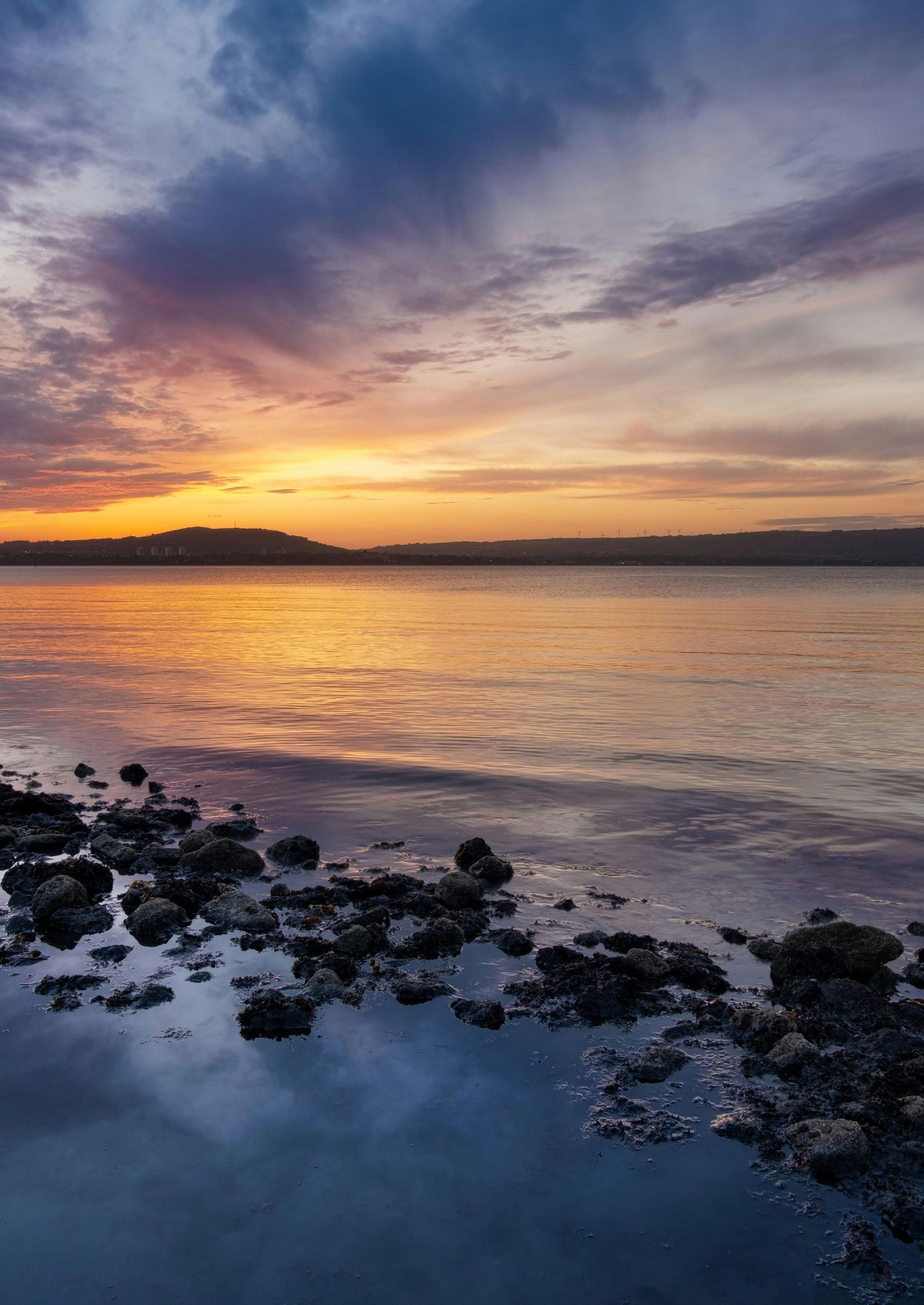












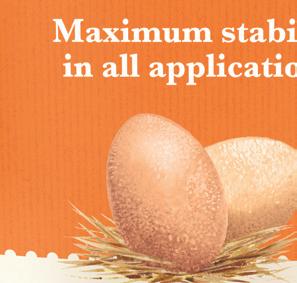












Managing Editor: Cyril McAree (01-6285447, cyril@hotelandrestauranttimes.ie)




























Managing Editor: Cyril McAree (01-6285447, cyril@hotelandrestauranttimes.ie)

As we edge closer to the budget and perhaps an election, maybe it’s time to reflect on tourism’s status. Recent reports give a mixed view. Year-on-year the sector seems to be suffering after the post-Covid boom. Recent surveys of visitor numbers and the domestic market show a sluggish performance due to a myriad of reasons. Some of those reasons - like the weather and less disposable income among foreign visitors - are out of the state’s control. Other factors, such as costs and lack of accommodation, are not.
How
The industry has called for a return to the 9% VAT rate.
But it seems this is not on the government’s radar. Other issues - such the continuing removal of hotels from the market to support migrants and the cap on Dublin airportindicate a lack of a cohesive strategy for the sector - and speaks volumes of governmental ineptitude.
Many politicians in the Dail do still not consider tourism to be a forceful economic player. A glance back over the last few governments seems to prove this scenario. We are all aware of the chaos which the 2008/2009 economic crash created in this country.
At the time Ajai Chopra, then head of the IMF, cited tourism as a key component on the road to bringing our economy back to a healthy position. Sure enough, within in a few years of the crash, our economy rebounded to a better state of finance on the back of tourism successes. Yet no lessons appear to have been learned. Over the last 14 years, the tourism brief has been positioned with strange bedfellows. In 2010 it was thrown into bed with Transport and Sport. These days it sits with six other portfolios (and lacks a Junior Minister).
How can the industry feel secure and positive when this is how it is treated?
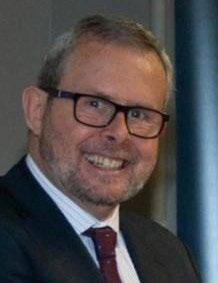
A number of pharmaceutical companies recently broke the news of their intended cessation of operations in Ireland, amounting to 515 jobs lost. This prompted an outcry and mobilisation of TDs. Councillors leapt onto the airways lamenting the situation and seeking support at the highest level in government. Many of these multinationals, while giving employment and tax revenue to the Exchequer, are beholden to shareholders and boards of management who are in business to make profit - and who now consider the cost of doing business in Ireland too expensive.
Meanwhile, Irish hospitality needs to think more about catering for those with disabilities. In our current online issue of Hotel & Restaurant Times we hear perspectives from people with disabilities.
For instance: a person in a wheelchair having to suffer the indignity of being carried upstairs to use the toilet. That is unacceptable in this day and age. The article finds that restaurants and pubs are the worst offenders. Offending establishments should ensure they have adequate and usable facilities in place for disabled visitors.
They are taking their business to less expensive countries and Ireland will lose out. But look at what Ireland has to offer as a tourist destination: a landscape that cannot be moved. Why don’t those same TD’s and councillors fight for this jewel in the same way as they have for departing pharma companies? If Ajai Chopra could identify the value of Irish tourism in 2010, why isn’t it supported at the cabinet table today? Visit www.hotelandrestauranttimes.ie
Cyril McAree, Editor f in
A nugget of welcome news is the appointment, pending until January 2025, of Paul Gallagher: new CEO of the Irish Hotels Federation. Paul brings a wealth of experience as a hotelier and a member of numerous boards associated with tourism. His honest and forthright approach to the business will be welcomed by many.


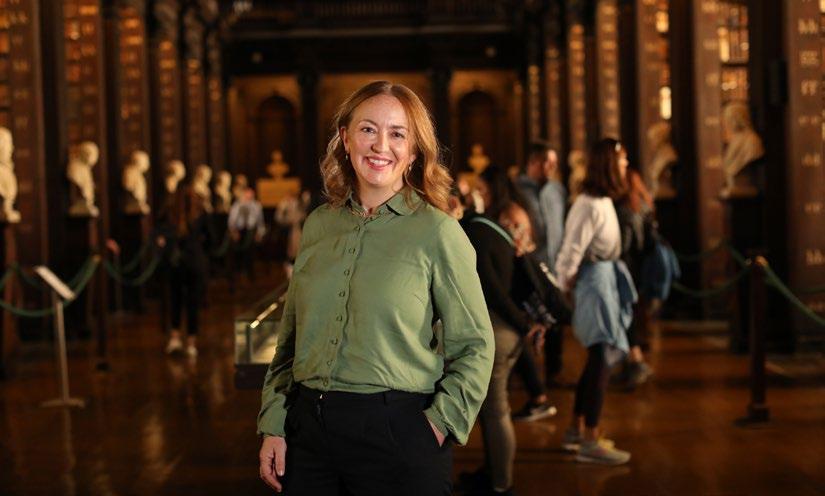
Visitor numbers to Ireland’s leading visitor attractions in 2023 are lagging behind pre-pandemic times, according to Ireland’s Association of Visitor Experiences and Attractions (AVEA). Around 18.1 million visitors enjoyed an “Irish visitor experience or attraction” during 2023. This compares to more than in 2022 but below 22.9 million visitors in 2019.
Catherine Flanagan, CEO of AVEA, pictured here at The Book of Kells, said: “There is no doubt that while the pandemic is in the rear-view mirror we are still in a period of transition. 2023 was considered the first ‘full’ year of tourism where aviation connectivity was restored to pre-pandemic levels. However, the ‘staycation’ market segment is still one that is of vital importance to Ireland’s visitor attractions.”
Visit Armagh is aiming to generate £35 million in economic impact across its tourism sector by the end of 2024, following its annual Food and Cider Weekend. Food and drink experiences rank as the number one attraction for visitors during short stays in Northern Ireland, according to Tourism NI’s 2024 Consumer Sentiment Research. Lord Mayor, Councillor Sarah Duffy [pictured] said, “We were delighted to welcome thousands of attendees to the Armagh Food and Cider Weekend: a testament to our region's growing appeal as a prime destination for food lovers. Events like these not only showcase our outstanding produce, quality ingredients, and world-class cider, but act as a significant driver for economic benefits throughout our region.”
German travel journalists enjoy a boat trip on the river Nore in Kilkenny with Oliver Treptow, Tourism Ireland (second right) and Cliff Reid, BoatTrips.ie (right). Eight travel journalists from Germany have been visiting Ireland’s Ancient East, as guests of Tourism Ireland and Fáilte Ireland. The journalists write for a mix of newspapers and magazines with a combined audience of 2.4 million across Germany. Their itinerary included a boat trip on the river Nore through Kilkenny, a guided tour of Kilkenny Castle and a visit to Smithwick’s Experience Kilkenny, as well as a walking tour of Waterford, visits to Lismore Castle Gardens and Mount Congreve Gardens and a cycle along the Waterford Greenway.

Waterways Ireland and Fáilte Ireland with Minister of State Anne Rabbitte TD have launched the completed transformation of Connaught Harbour, as part of the Shannon Tourism Masterplan, following a €2.8m investment. This plan aims to position the Shannon as a destination for international and domestic tourism, transforming the region into a key tourist destination amongst Ireland’s Hidden Heartlands.
Pictured at the launch is: Anne Rabbitte T.D. Minister of State; Marie Healy, Fáilte Ireland; Phil Cargil, Éanna Rowe Waterways Ireland; Eoghan O’Brien, Department of Housing, Local Government and Heritage; Cllr Ivan Canning
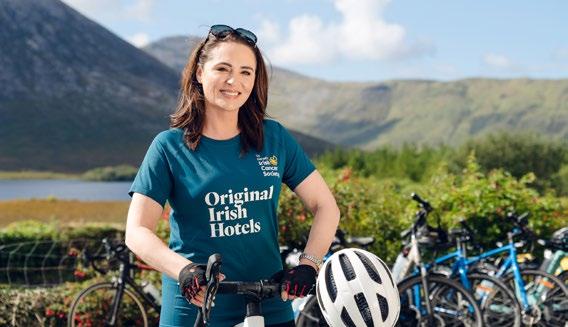
Gráinne Seoige is pictured launching Original Irish Hotels’ epic 8-day charity cycle along the Wild Atlantic Way in aid of Irish Cancer Society. From Monday, 30 September 2024, Original Irish Hotels team members, guests and local supplier will embark on the charity cycle starting at Casey’s of Baltimore in Cork and finishing on Monday 7 October at Arnold’s in Dunfanaghy in Donegal. www.idonate.ie/event/originalirishhotelscharitycycle

and Paddy Mathews, Fáilte Ireland. The works have seen the harbour transform from a working depot to a new visitor destination, incorporating berthing for 28 craft. The site has been opened up as a public space to include visitor facilities, a pavilion structure and parking facilities with EV charging points.

German business travel buyers visiting Howth with Julianne Cassidy, Fáilte Ireland (second right), and Orla Kraft, Tourism Ireland (right).

Five travel journalists from Britain are visiting Ireland’s Hidden Heartlands as guests of Tourism Ireland and Fáilte Ireland. Their itinerary includes a cruise on the Shannon on a cruiser that uses HVO sustainable fuel, a guided walking tour of Athlone, Clonmacnoise and Lough Key Forest Park (pictured).
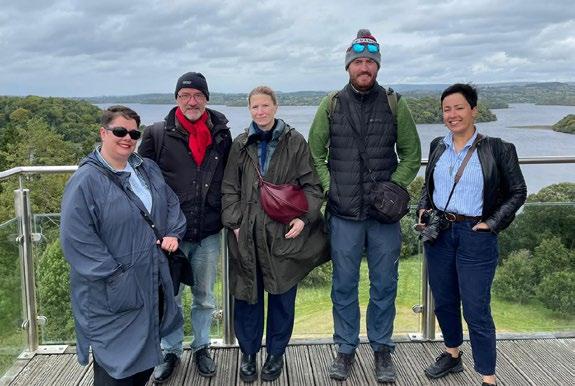
British coach operators are pictured before embarking on a boat tour of Killary Fjord in northern Connemara with Alex Goor, Killary Fjord Boat Tours (left); Linda Duncan (second left) and Caroline Mulligan (third left), both Tourism Ireland; and Letty Cronin, Fáilte Ireland (sixth left).
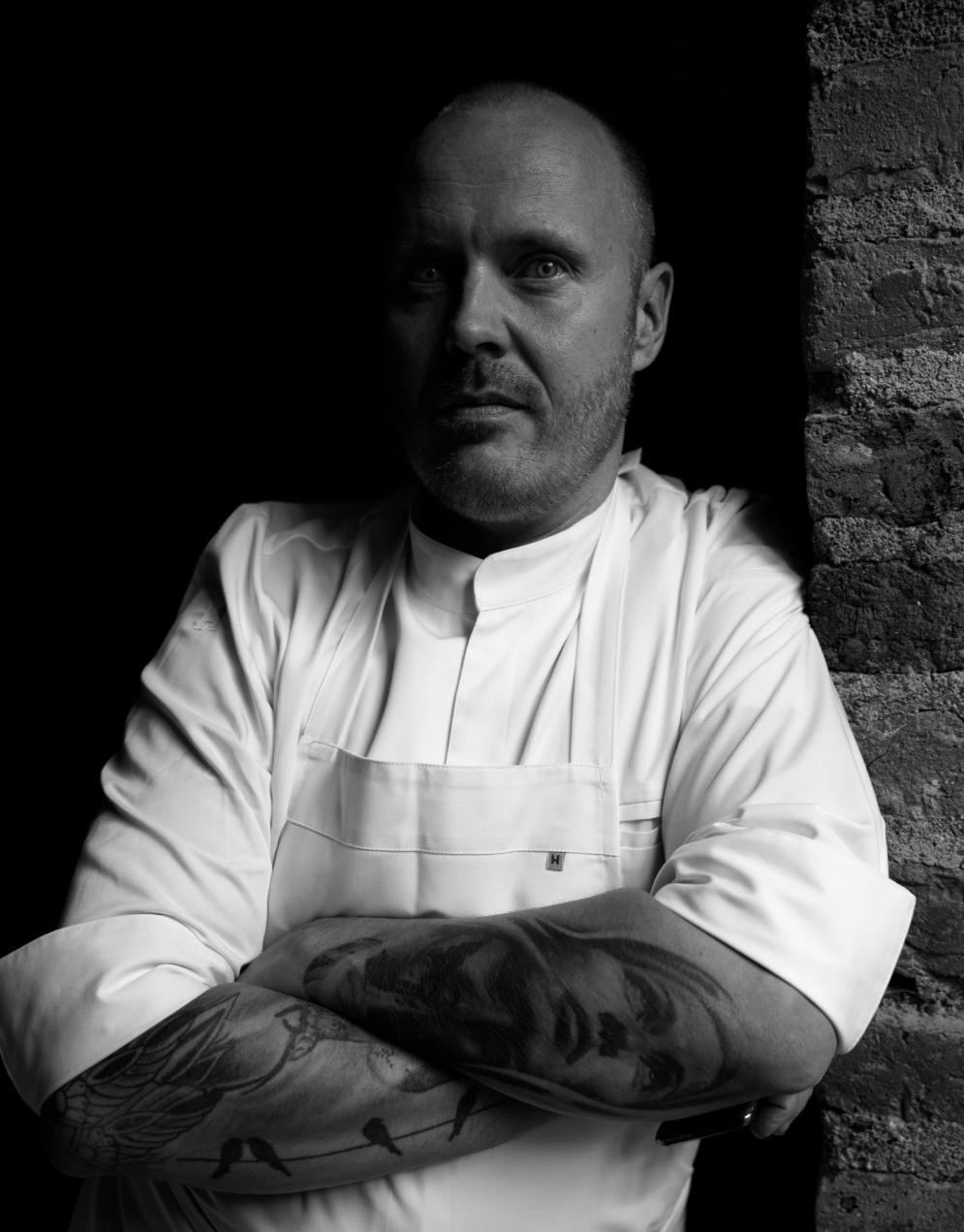
Ballyfin, a country house hotel in County Laois at the foot of the Slieve Bloom Mountains is welcoming Mickael Viljanen, a Michelin awarded chef, to create a dining experience for one night only on Sunday 29 September. Mickael Viljanen, Chef Patron of Chapter One, has won many awards for his innovative approach, which is “centred on the ethos of simplicity and quality ingredients”. The philosophy is shared by Richard Picard-Edwards, Ballyfin’s Executive Head Chef.
On the night, “guests will enjoy a champagne reception on arrival before moving to the state dining room. Both chefs will introduce themselves and their expertly crafted dishes at the start of the evening. Wines will be paired with each dish on the exclusive menu. Guests can then retire to the Cellar Bar for a night-cap and a chat with the chefs.”

Tomás Ó Siocháin, CEO of Údarás na Gaeltachta and Miriam Kennedy, Head of Wild Atlantic Way, Fáilte Ireland pictured in the former Aran Islands Heritage Centre in Cill Rónáin, Inis Mór, Co. Galway which will be the site of a new capital investment project from Fáilte Ireland and Údarás na Gaeltachta.
Fáilte Ireland and Údarás na Gaeltachta have announced €4million capital investment funding to support two major tourism development projects on the islands of Árainn (Inis Mór) in Co. Galway and Cléire (Cape Clear) in Co. Cork.
Little Pyg, based in Dublin’s Powerscourt Townhouse, has made history on the global pizza stage. Little Pyg was named Ireland’s top pizzeria and earned a spot in the Top 100 Pizzerias in the World at the World Pizza Awards held in Naples. Pictured is Federico Rapali, Little Pyg’s head chef.
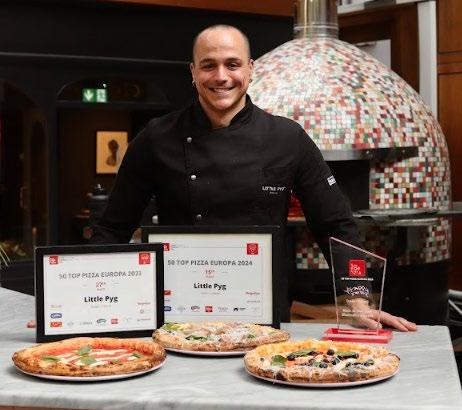
Stories Parfums has become the Culloden Estate & Spa’s first-ever fragrance partner. The 5-star hotel’s spa will now stock a range of products from the niche luxury perfume house. Pictured at the announcement are James McGinn, Managing Director of Hastings Hotels and Tonya Kidd-Beggs, Founder of Stories Parfums.

A team of employees from Dalata Hotel Group recently embarked on a gruelling 1,100kilometere cycle, one of the longest charity cycles in the country, crossing 21 counties in aid of the Group’s charity partners: The Marie Keating Foundation, Air Ambulance NI and Leukaemia Care.
Pictured are:
Phoebe Schecter, NFL Analyst; Niall Macklin, Dalata Hotel Group Head of Acquisitions; and Ciaran Kilkenny, a Dublin Gaelic footballer.


Bord Bia has announced a shortlist of organic food and drink producers for the National Organic Awards 2024,

Oliver Dunne Restaurants will open their 10th restaurant, ONE Ballsbridge Bar & Restaurant, on 25 September in Ballsbridge, Dublin 4. The new venue will create 70 new jobs in the hospitality sector, adding to the 250 staff members already employed across the group.
The restaurant group was established in 2006 by Oliver Dunne, a Michelin Star chef, and Aidan Crowe. Other restaurants in the group include: Bon Appetit; PINK Restaurant; Cleaver East and Beef & Lobster Dublin/Galway; Ribeye Steakhouse Malahide; Toro Tapas Bar; Social Bar & Restaurant Drogheda and The Morehampton Donnybrook.
held in association with the Department of Agriculture, Food and the Marine, to celebrate the achievements and high standards of organic growers, producers, and manufacturers in the country. The winners of the National Organic Awards will be revealed at an awards ceremony that takes place on Thursday, October 17,
The 4-star Ferrycarrig Hotel in Wexford, situated on the edge of the River Slaney, is offering an autumn break:
a two-night mid-week stay, with a full Irish breakfast, from €395 for the total stay for 2 people sharing. Ferrycarrig Hotel features the award-winning Reeds Restaurant, the Active health & fitness club and 20m swimming pool. www.ferrycarrighotel.ie
in the Bord Bia Global Hub in Dublin. Judges who reviewed the shortlisted companies, at the National Organic Food Fair at Merrion Square in Dublin, included chef Clodagh McKenna, food writer Suzanne Campbell, chef Janine Kennedy, food consultant Annie Dunne, and retail expert John McDonagh.
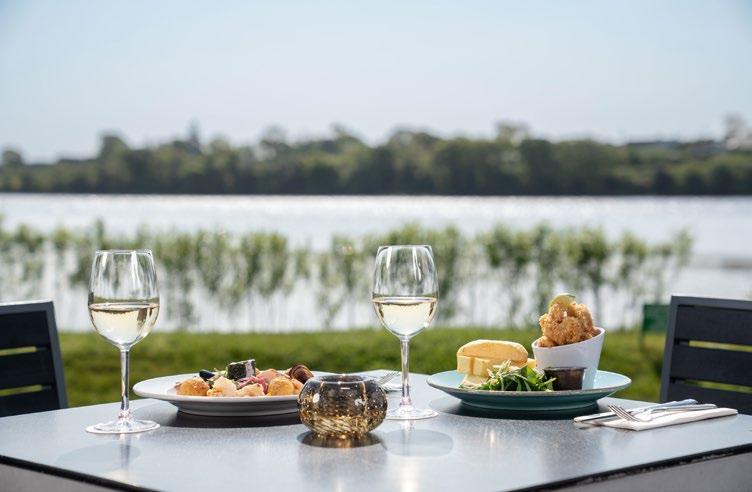
James Lawless, Minister of State at the Department of Transport, recently met with Ryanair chief executive Michael O’Leary to discuss the passenger cap at Dublin Airport. Minister Lawless said:
“I reaffirmed to Mr O’Leary that the National Aviation Policy remains that we wish to grow connectivity out of Dublin Airport.”
The meeting marks the beginning of a consultation process with key stakeholders on the passenger cap and other aviation issues.
After the meeting, Minister Lawless said:
“I would encourage Ryanair to revisit their Shannon, Cork and regional airport schedules. I would urge them to be more creative in their use of
Dalata Hotel Group has reported revenue growth of 6% to €302 million for the first quarter of 2024. The group have also announced...
“adjusted EBITDA [earnings before interest, taxes, depreciation and amortization] growth of 4% to €108 million”, said Dermot Crowley, Dalata Hotel Group CEO.
“Trading has been softer than we expected...

the regionals. Not everybody lives in Dublin, I can see no reason why sporting trips, or excursions to Lapland, cannot operate from other airports outside Dublin.”

A total of 612 restaurants, cafés, gastropubs and other food-serving hospitality businesses have permanently closed their doors since the VAT rate for the sector increased from 9% to 13.5% in September 2023, according to the Restaurants Association of Ireland (RAI).
The annual closure figure arrives amid the RAI’s campaign to have the 9% VAT rate on food reinstated in Budget 2025.

...of late and there is a return to a more measured domestic customer spending behaviour in Ireland and the UK. I continue to view Dublin as a great city in which to operate hotels. Despite the digestion of approximately 2,500 (9%) additional rooms in the city since January 2023 and the 4.5% VAT rate increase introduced on September 1 2023, RevPAR for the period January to July is only down 5.4% versus last year for the market. I am delighted that we outperformed the market with RevPAR for our portfolio down 4.6% for the same period.”
BY GEORGE!
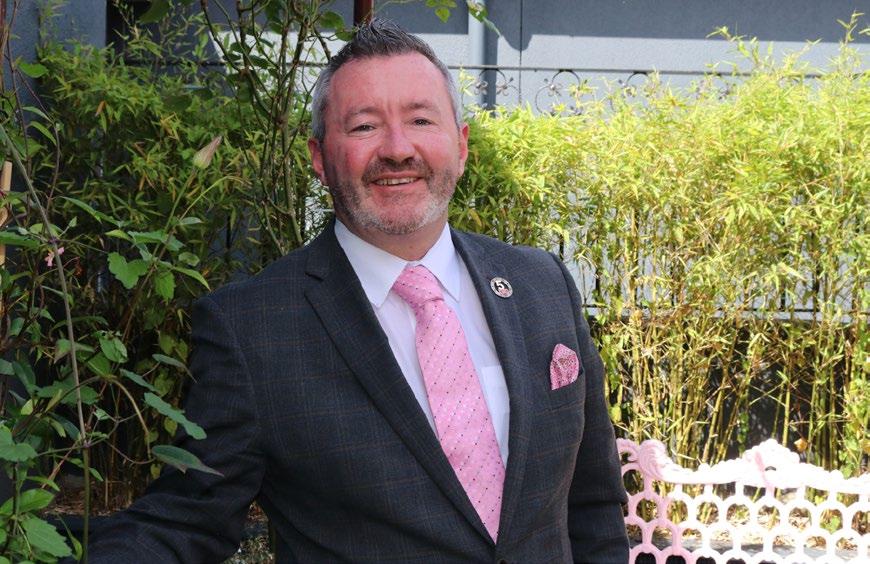
Midlands Park Hotel, part of Neville Group Hotels, has announced the promotion of George Leahy to General Manager at the four-star hotel. George takes over from Dara Cruise, who was recently appointed Group General Manager of Neville Park Hotels, encompassing Midlands Park Hotel in Portlaoise, Riverside Park Hotel in Enniscorthy, Co Wexford, and Crown Quarter in Wexford Town George joined Midlands Park Hotel in 2018 as Banqueting Manager, becoming Hotel Manager in 2022. George previously held management positions at leading Irish properties including Brandon House Hotel, The Montenotte, Castletroy Park Hotel and Adare Manor.
The Johnstown Estate in Enfield, Co Meath, has introduced Tommy Butler as its new Executive Chef. A native of Cork, Tommy brings more than 25 years hospitality experience to the four star hotel and spa. Before joining The Johnstown Estate, he was Executive Chef at Portmarnock Resort & Jameson Golf Links, a role he previously held at Farnham Estate in Cavan. Tommy’s other prior experience in Ireland includes The Radisson Blu Royal Hotel Dublin, the Talbot Hotel Stillorgan and Clarion Hotel Cork. Tommy has honed his skills internationally in France where he worked in Michelin-starred restaurants including Le Relais De Sevres in Paris, and in Australia, where he discovered his love for fusion food. Tommy regularly showcases his favourite recipes on Virgin Media’s Ireland AM.

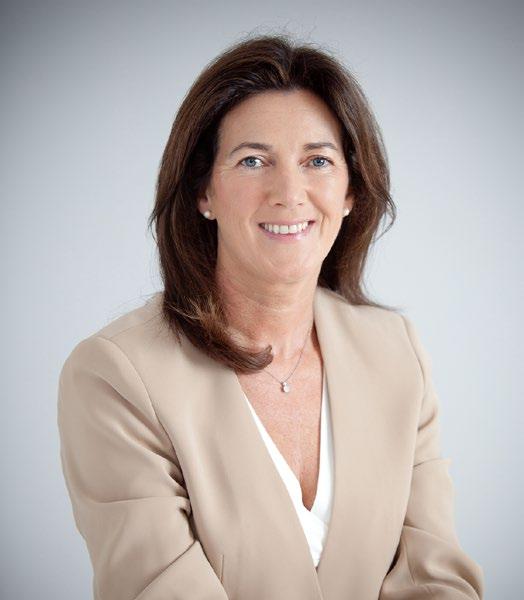
Brodericks, a supplier of commercial catering solutions, has announced the appointment of Grace O’Shaughnessy as its new Chief Executive Officer (CEO). Grace joins Brodericks at a pivotal time for the company as it continues to expand its operations and strengthen its market position. She served as Managing Director of Java Republic for the past 15 years, holds an Executive MBA in Business Administration and Management, and held senior operational positions at food companies such as Lir Chocolates and Kylemore Foods.

John Toner has been a leading figure of the hospitality industry for over 40 years and is well known for promoting an all island, cross-border approach to the Irish tourism and hospitality industry.

Throughout his distinguished career he has received numerous accolades and has recently published a memoir entitled” A Job Well Done’ I recently sat down with John, and he shared some of his experiences, challenges and memories of his time in the industry John was born in Mullaghmore, in County Sligo before his move to Northern Ireland as a child. His father worked in the Munster and Leinster Bank but growing up John had no desire to follow in his father’s footsteps.
John has no fond memories of his school days as the educational environment was ‘tough very hard ‘at that time. He was 16 years old when he got his first summer job waiting tables at the King's Inn in Larne in County Antrim.
On completing school, he decided that the academic world was not for him, and he decided that he would like some training and experience working in hospitality. A good friend and mentor, Hugh Bennet, encouraged him to apply for a training programme at the renowned and well established ‘Rockwell College’.
“Rockwell College was first class; it was an amazing set up. I learned so much. I don’t believe anyone entering the industry, gained a training quite like we did at Rockwell We had our own farm, with cattle and sheep, we learned how to grow vegetables and butchering, crafting and service”
Rockwell was the traditional ‘Farm to Fork’ experience and he acquired a varied and robust skill set. John proceeds to share how amazing the team was at Rockwell and the fellowship, the support, inspiration and friendships. This is central throughout John career; the importance of fellowship, of how people can work together and learn from one another.
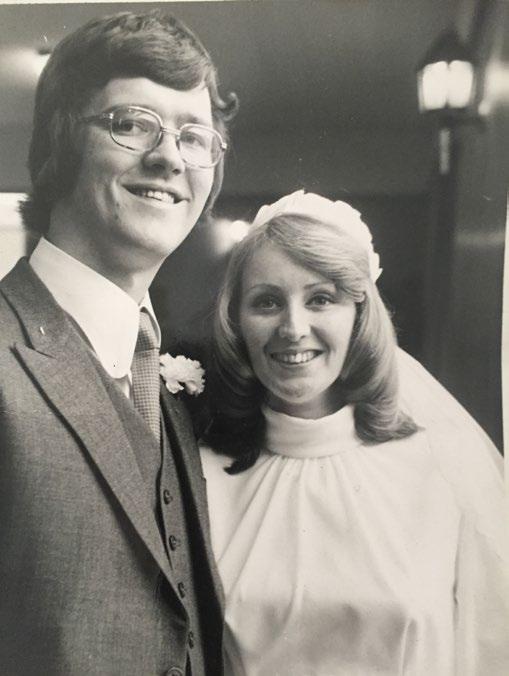
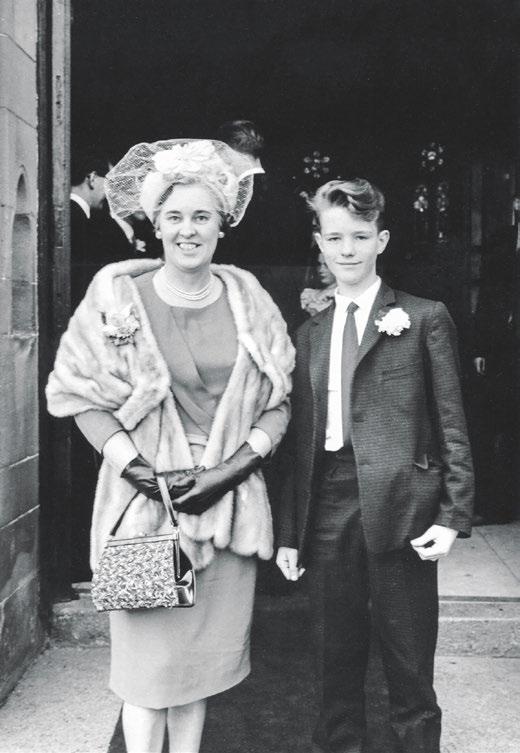
After graduating from Rockwell, John worked at the Great Southern Hotel in Sligo and then made his journey across the waters to undertake a training programme, at ‘Simpsons in the Strand’ in London.
Emigrating to a major city was a big step for a young country man and relations between the Irish and English people were quite strained at that time.
“London wasn't a nice place to be in for a young Irish man in the mid-60s The English didn't bother me with me at all.
The only people who I formed any kind of friendship with was the Jamaicans or the Syrians, I got on really well with them. Throughout my whole time working there I was never called’ John’, it was always ‘Paddy’

After Johns father passed, his mother was anxious for him to return home. Of course, he could not return jobless, so she took the task of finding him a job into her own hands.
John shares a humorous story which reflects his mother’s determination and forthright nature, a characteristic that John has inherited!
“At the time the Grand Central Hotel was an upmarket, prestigious busy hotel in Belfast. On arrival my mam asked to speak with the General Manager. She said to him ‘I have a son in London working on a training programme at the ‘Simpsons in the Strand ‘hotel’.
I want him home, have you got a job for him? The manager replied well if he has any of the ‘guile’ you have, he will do me!”
At this point the tourism and hospitality industry was thriving in Belfast. The hotel was always fully booked, and business was booming. Tragically this booming period was to transcend into bombing, civil unrest and carnage as the troubles began. John shares some heart wrenching stories of this time
“The year 1969 really sticks out in my mind. I was Deputy Manager of the Grand Central Hotel, and the loyalists started firing bombs

into the houses in Bombay Street, which runs between the Falls and Shankill roads.
I remember going up to the top floor of the hotel and this mighty fire was raging down the street. That was it, that was the end of it all...”
“That incident took place on a Tuesday or Wednesday and I noticed on Friday, which was payday, that seven wage packages had not been collected. That struck me as being highly unusual, no one could afford not to pick up their wages. They were never picked up and I always wondered why this happened”
John took on many ventures in the proceeding years, however, the hospitality industry in the North was virtually nonexistent as it was a ‘no go area’ for tourists. It was at this time that John was approached by Billy Hastings of the Hastings Hotel Group to manage some of the many hotels which were being restored at this time, most notably the Stormont and Slieve Domard hotels.
The air of discontent tarnished the industry, and it was becoming increasingly difficult to conduct business in the current climate. Several years on, John was approached once again by Billy Hastings, who asked him to become involved with the refurbishment and management of the Europa hotel in Belfast.
It was a role he was initially reluctant to take on, but it was not in John’s nature to shy away from a challenge and through hard work and determination it became’ A Job Well Done’ Other highlights of John career include winning the UK Manager of the Year award in 1998. This was a major accomplishment for an Irishman to win such a prestigious award. Through his involvement with the Irish Hospitality Institute, he won a Lifetime Achievement award. During his time with the Institute, he was president from 1999-2001 and he remains a lifetime fellow and member.
John’s active involvement with the Irish Hospitality Institute is significant, as it built a relationship, a connection between northern and southern hospitality groups. John shares that the long-standing r friendships he made during his time with the Institute were invaluable “Recently I have had many friends in the industry and from the institute visit me. This has meant so much to me and I really appreciate them coming. My connection with them is very important to me. This takes my mind off my illness it's like a form of therapy for me”
We also discussed the role of management in hospitality and how it has changed drastically over the years. Technology is now a primary
John and his work within the industry is legendary. The strong friendships, the shared experiences, the support and connections he has made are a testament to his character. John possesses an innate gift for storytelling, captivating his audience with some humorous antidotes as well as reminiscent reflections of personal challenges and the tragedies of the time
feature in the running of businesses in the industry. John recalls a time when everything was handwritten and manual in comparison to the use of apps which show in real time the performance of the business and other helpful data.
The day-to-day management of a hotel looks very different also. These days, managers are required to spend more time in the office doing a varied number of tasks and their position carries a wider scope of responsibilities and accountability. It can be argued that they are not as present or visible in the establishment.
“As a manager I spent a lot of my time integrating with the customers I still had to manage the day-to-day running of the hotel as a business, but my main focus was on the customers I spent time with them walking about meeting greeting that was an integral part of my job.
I concluded my interview with John by asking him if he has any regrets about his time in the industry. “I have never even thought about regrets. All I can say is to do what you feel is right and if it doesn't work out move on. I can accept that I make mistakes, but I move on and learn from them. I don't look back with regrets that I made that mistake”
John lived and worked throughout ‘The Troubles’ in Northern Ireland. His memoir is a must read, a thought-provoking reflection of the life and times of one of the captains of our industry. We would like to thank John for taking the time to sit with us and share his stories, while he is battling a major illness, and we wish him well with his recovery. John’s Book is available to purchase at www.burnsbooks.co.uk
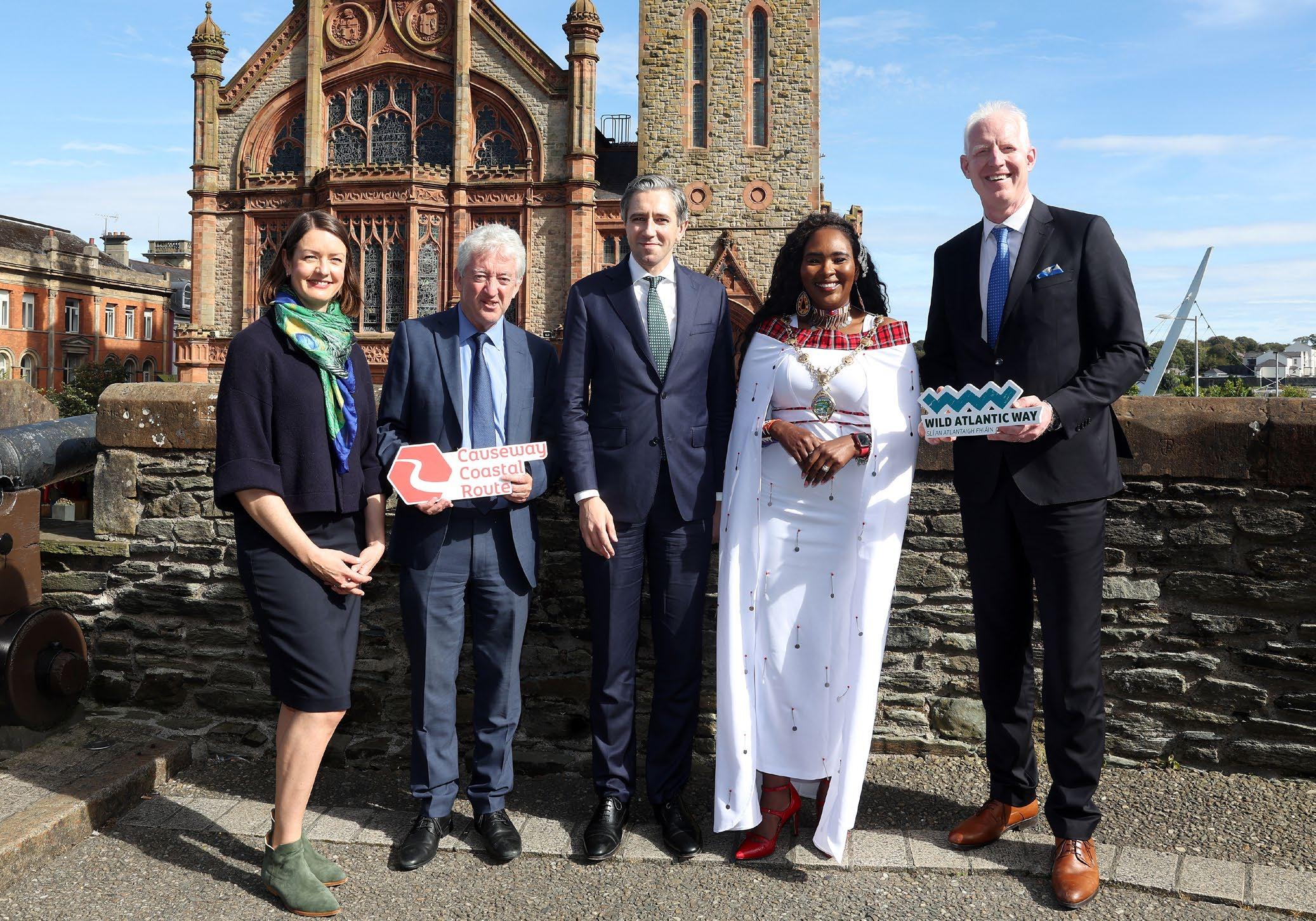
Taoiseach Simon Harris T.D. today joined with John McGrillen, CEO of Tourism Northern Ireland, Paul Kelly, CEO of Fáilte Ireland and Alice Mansergh, CEO of Tourism Ireland to welcome progress with the implementation of the Shared Island Wild Atlantic Way/ Causeway Coastal Route Tourism Brand Collaboration Project.
The Government of Ireland allocated €7.6m from the Shared Island Fund for this cross-border tourism brand collaboration and marketing initiative which is delivered on a cooperative basis by Tourism Northern Ireland, Fáilte Ireland and Tourism Ireland, in consultation with the Department of Tourism, Culture, Arts, Gaeltacht, Sport and Media (Ireland) and the Department for Economy (Northern Ireland).
The Shared Island Wild Atlantic Way /Causeway Coastal Route Tourism Brand Collaboration Project is creating synergies
between these two iconic touring routes and bringing benefits to the North West and Northern coast regions by supporting new opportunities that create lasting tourism impact and economic benefit.
As part of this collaboration, Minister for Tourism, Catherine Martin T.D. and Minister for the Economy of Northern Ireland, Conor Murphy MLA, in July announced a new funding scheme – the Coast to Coast capital investment fund – jointly administered by the three tourism agencies and worth €3m/ £2.5m to enhance interpretation at existing operating visitor attractions and experiences along the north of the Wild Atlantic Way and along the Causeway Coastal Route.
There has been a very strong response to the expression of interest phase in August and the call applications will open in the coming weeks, with detail published on the websites of the 3 Tourism Agencies.
Taoiseach Simon Harris said:
“I am delighted to join with the CEOs of the three Tourism Agencies on the island this morning to highlight their positive collaboration, supported through our Shared Island Fund, to link the Wild Atlantic Way and Causeway Coastal Route brands.
“This will undoubtedly create more opportunities for tourists from both home and abroad to experience all that Derry and the amazing North West and Northern coast regions have to offer, and I look forward to seeing the outputs of this impactful project”
Paul Kelly, Chief Executive of Fáilte Ireland, said:
"The Shared Island Tourism Brand Collaboration Project will enhance and link the visitor experience across these two iconic routes, the Causeway Coastal Route and the Wild Atlantic Way, helping to extend the economic benefits of tourism to local communities throughout these areas.
“It was a pleasure to meet with Taoiseach Simon Harris today to discuss the progress of this important initiative, and I look forward to continued collaboration with our partners in Tourism Northern Ireland and Tourism Ireland. Together, we are committed to ensuring that this project delivers long-lasting benefits for visitors and residents alike, while protecting and celebrating the natural beauty that the island of Ireland is renowned for."
Alice Mansergh, Chief Executive of Tourism Ireland, said:
“I was delighted to meet Taoiseach Simon Harris today and discuss the Shared Island Tourism Brand Collaboration Project.
“At Tourism Ireland, we market the island of Ireland overseas, sustainably increasing the value of inbound tourism for economies and communities island-wide.
Making it easier to navigate from the spectacular Causeway Coastal Route to the northern section of the Wild Atlantic Way – and vice versa – is a real win.
“We will be communicating to overseas visitors to inspire them to do more and see more, bringing greater economic benefit to these parts of the island.”
John McGrillen, Chief Executive of Tourism NI, said:
“Tourism is one of Northern Ireland’s most important economies and the Shared Ireland Tourism Brand Collaboration Project will further maximise our rich tourism offering in the international marketplace.
“By enhancing the experiences enjoyed by both domestic and overseas visitors along the Causeway Coastal Route and Wild Atlantic Way and raising the profile of these two magnificent touring routes, our collective goals of extending visitor stays and increasing levels of spend can be achieved.
“It was very beneficial to meet with the Taoiseach today to discuss the Shared Ireland Tourism Brand Collaboration Project and update him on its implementation. I look forward to continuing to work with our colleagues in Failte Ireland and Tourism Ireland to deliver these exciting plans.”
Photo Caption:
Taoiseach Simon Harris T.D. joins with John McGrillen, CEO of Tourism Northern Ireland, Paul Kelly, CEO of Fáilte Ireland and Alice Mansergh, CEO of Tourism Ireland, along with Mayor of Derry City and Strabane District Cllr. Lilian Seenoi Barr, to mark the positive progress of the Shared Island Wild Atlantic Way/ Causeway Coastal Route Tourism Brand Collaboration Project.
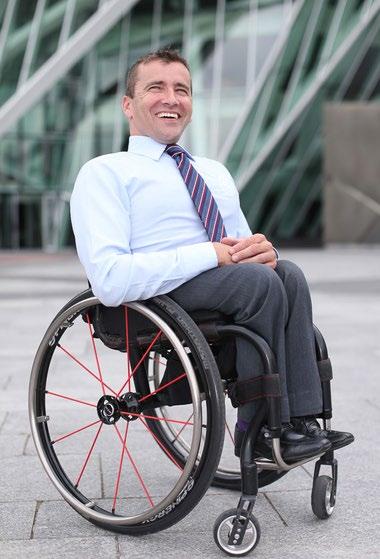
While conditions in the hospitality sector have improved over time for people with disabilities, according to Limerick native and Dublin resident John Fulham, who is a spokesperson for the Irish Wheelchair Association, a lot of work needs to be done to level the playing field for those with accessibility issues.
“I got my first wheelchair when I was 4, so I’ve gone through all of life’s stages as a wheelchair user, from growing up, getting a job, getting married and having my own family, and still every now and then when I try to book something the reality of the obstacles that wheelchair users face still hits me in the face.”
Inclusion and diversity are words regularly used in society to challenge people to look at how they accept others and their place in society. Despite this one group so often overlooked and paid little or no attention are in essence those with a disability. So, what is it really like for some of those people to access our hospitality industry? In the article two individuals give a somewhat reflective view of how they feel excluded and how the sector and indeed society needs to relook at this situation.
John says he can never take it for granted that he’ll be able to access an establishment.
“If I want to meet friends for something to eat, the first thing I’ll ask is ‘is that accessible’. I always must make an inquiry. Sometimes it will, sometimes it won’t be and while things have improved, they haven’t gotten better to the extent that I wouldn’t have to check somewhere.”
John feels that for a lot of places wheelchair access is seen as something that is nice to have rather than a must have.
“A lot of places aren’t kitted out for wheelchair users, every weekend I look at the restaurant reviews in The Irish Times”, he says. “I look at a restaurant review and it might get an 8/10 rating, but it doesn’t have wheelchair accessibility. I don’t know how a place can get that if it is...
...denied to wheelchair users. Whilst people may say a place should be judged off its food offering, and I understand that, I however think it should be more than that.”
Having good accessibility would also benefit the restaurants’ bottom line according to John as they are opening their doors up to a lot more people.
“It's a gradual improvement. Some places say that they want to be accessible, but when push comes to shove it’s the one thing in the business they’ll seemingly compromise on.
They don’t see the potential that people with disabilities and their families can bring to their business. Even older buildings and listed buildings can be overcome without compromising the integrity of the building.”
Some places have even regressed in their stance on wheelchair access.
One restaurant in Dublin used to have a wheelchair accessible toilet and after it was taken over by new management I went in and asked to use the toilet and they said they didn’t have one, and it turns out it was turned into a staff room and storage area. It’s not seen as a priority.
The definition of access needs to be more clearly defined according to John as the standard of accessibility can vary wildly from place to place.
“There are recommendations for people with disabilities but
they are not best practise. Just because a wheelchair accessible toilet has a sign on the door doesn’t mean it’s fit
for purpose.”
The toilet paper could be behind the back of the toilet where I can’t get to it. I’ve been in plenty of places where there isn’t proper circulation space on the floor, or when I get in there, I can’t find a toilet that offers me the dignity of being able to close the door behind me or the mirror and hand dryer will be high up and I can’t get to it.
There is a subjectivity to it that’s brought by people’s definition of the term accessible, that’s where people get away with it not providing proper facilities to the fact, and as such fits their idea of accessibility where it really isn’t. Anecdotally less than 50% of restaurants are properly kitted out for wheelchair access.” When it comes to bars John describes the situation regarding access ‘as a whole different ball game’
“The majority of pubs I go to I won’t be able to use the toilet even circulating around would be hard enough. I don’t have air and graces about myself to think I’m special, but all I want is the same dignity as everyone else. People use the term equality which means everyone can get in to the pub. But equity means that I can get into the pub and use the facilities to the same level as everyone else.”
Some premises have a haphazard approach to wheelchair access, with proper facilities in places that are out of reach as John explains. “I was at a stag in Galway a few years ago with four wheelchair users and the facilities were upstairs, and the bouncers had to carry us up the stairs, which, while somewhat awkward, I didn’t mind at the time. But then when we got up, it was a perfectly functioning wheelchair toilet. It just didn’t make any sense as to why it was positioned upstairs. I was delighted to be able to use this, but it was so bizarre re its placement.”
The lack of facilities has had an impact on John’s social life, leading to him rarely going out.
“I don’t go drinking in pubs anymore, it’s just not any enjoyable experience. I’d say less than 20% have proper wheelchair toilets and this ironically is a missed opportunity. So many restaurants and pubs are looking for government support re Vat for instance, yet they all seem ignore a potential market, which would help their profitability. Going to the pub is meant to be an enjoyable experience. I joke with the lads that I employ a fluid management strategy, which means that there are no toilets for me. You’re stripped of your dignity. I’ve been to plenty of places and when I go, they send me to a door around the back, I go through the kitchens and I’ve seen plenty of the less glamourous aspects of establishments. It’s a form of segregation. I won’t allow myself to be carried upstairs anymore.”
Other countries have much better measures in place to ensure better accessibility and John believes it’s something we should look at in Ireland.
“The USA may appear to be divided in terms of attitude and prejudice, however it has very good legislation and mandatory standards regarding this issue, everywhere is accessible and as such there is nowhere there I couldn’t go, that’s because access is enshrined in legislation, and it works.
That’s where we’re going to have to go in this country, and when it’s done, people with disabilities need to be present in the room and be front and central in setting out the legislation for people with disabilities.”
According to John, this improvement needs to be carried out across all different sectors, not just in hospitality.
“The need to examine our culture towards minimum standards when it comes to accessibility in Ireland, is not just about the hospitality sector. For example, I can’t use
the new recyclable bottle machines. They’re too high. I’d question what consultation took place, if any took place with people with disabilities, it’s somewhat of a stealth tax for me for instance, because I can’t reach the machines. I can get someone else to do it for me but that’s not the point. Another example is with electric cars.
You get tired with everything being a fight all the time. It’s like a battle just to get to the starting line. Things are getting better, but it’s slow, but for every time there is an improvement in one place you have to start from the beginning elsewhere."
Having lost his vision in his early teens due to a rare condition in his early teens, Donegal native and Dublin resident Kevin Kelly had to learn to live his life without his sight.
“I lost my sight in 2001 due to retinal detachment when I was 14. It’s uncommon that doctors weren’t able to restore my sight, but several years later I found I have had a rare condition called stickler syndrome which affected the connective tissue and when they reattached the retina it peeled off like a piece of wallpaper”,
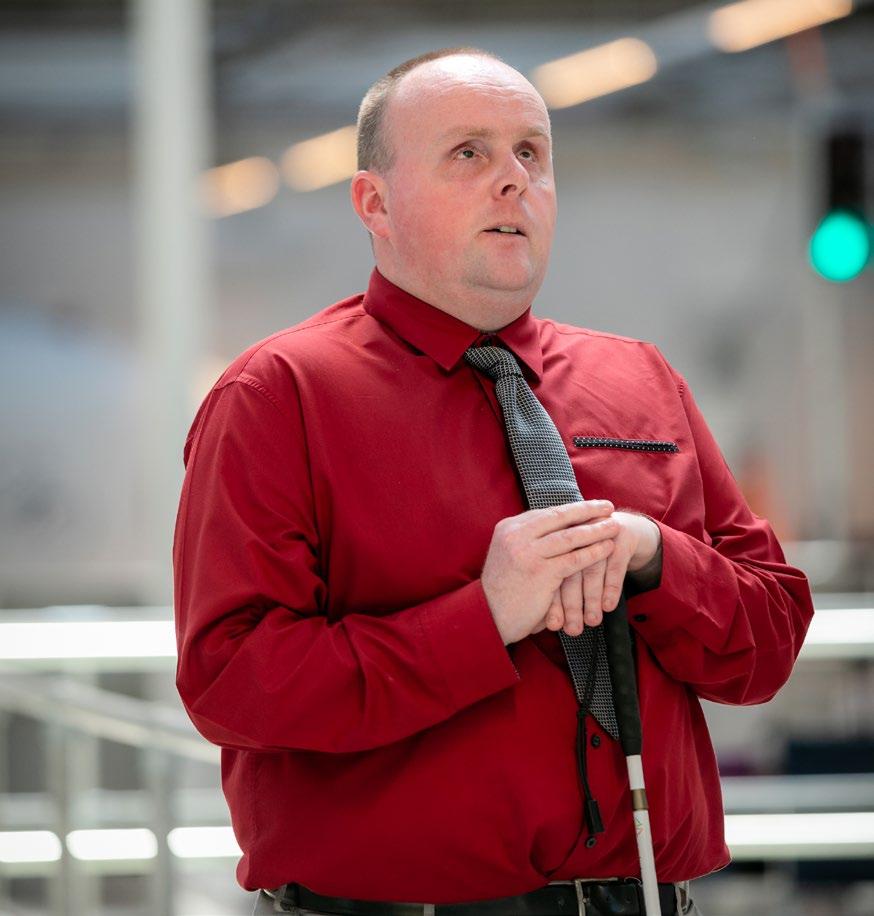
...said Kevin who works as Head of Policy Partnerships and External Affairs for Vision Ireland, while also serving as Vice President for the European Blind Union.
Being a child made it easier in ways for Kevin to adapt to his new condition than if he was an adult, as he explains “I was quite young but had lots of friends and family which kept me busy. I often think if I had lost it later in life in my 20s or 30s when I had moved out of home and was working, driving etc it would have been a lot harder. As a child in rural Donegal, you’re very dependent on family anyway.” However, it became more difficult as he got older and moved to a new environment.
“When I moved to Dublin, I didn’t have a visual memory of my surroundings and it was only then that it fully hit me that I was blind, I didn’t know what my future held. But I got a lot of help from Vision Ireland (formerly NCBI), who taught me a lot of simple but vital life skills like how to make a cup of tea, how to make a sandwich, right up to how to touch type, and how to use technology.”
While there have been some improvements for people with vision loss or impairment in the hospitality sector, Kevin says it’s been inconsistent.
“It can be a mixed bag, I’m not sure if staff are always trained to cater for people with disabilities. It’s a problem in the hospitality sector, a lot of the work is seasonal so there’s a high turnover of staff. When it comes to accessing menus, very few have Braille menus, but in recent years there have been apps developed so people can take a photo of a menu and reads it out. It gives you a level of control whereas before you were depending on the person serving you to read out the menu to you, which was off putting as you would feel self-conscious. Some places also
have QR codes that you scan and the device then reads the menu back to you.
It’s becoming more universal. A lot of places have QR codes which were installed as a way of people being able to place their orders online, which is an example of technology being developed for non-disabled people which inadvertently ended up helping able bodied people.”
However, some people still have difficulties in this area as Kevin explains.
“For someone who acquires sight loss later in life or is early in their sight loss journey, it takes a long time to get up to speed with all these things. It’s not a silver bullet, but it has certainly helped.”
There are other issues where he would like to see an improvement.
“For people with vision impairment there’s not as many physical barriers as other disabilities may have. I have a guide dog and have never encountered any difficulties with it, but sometimes people with guide dogs have issues with staff who don’t realise that they are permitted by law. I’d like to see more awareness within the industry and for owners to realise that increased access is only a good thing. Failte Ireland are making tourism more attractive for people with disabilities, which I definitely endorse, because people who are blind/visually impaired like to go out, socialise, have a meal and travel just like everyone else.”
So hopefully those businesses looking for VAT reductions may look at this business sector and embrace its possibilities.

Another competitive and friendly day was had by all with plenty of networking and industry interaction at the Annual IFSA Golf Outing on Thursday, 5th September at Castleknock Golf Club.
Alongside the general competition, IFSA emerged victorious as Association Challenge Champions after taking on teams from the various association trade bodies including The Panel of Chefs, Chef Network and The Catering Managers Association.
BWG Foodservice were victorious in the Yellow Ball Competition this year while Derek McLoughlin (Panel of Chefs of Ireland), Sean Singleton (Entegra Ireland Ltd) and Colum Slattery (BWG Foodservice) were 1st, 2nd and 3rd respectively in the singles competition.
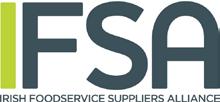
For more information contact: Louise McLoughlin at louise.mcloughlin@ifsa.eu.com or on 086 2780979.
Chefsrange GF90 - 22 Ltr Single Tank Gas Fryer (3 Burner)
Chefsrange GF90 is a 22Ltr single tank gas fryer with 3 burners, perfect for any commercial kitchen. The three powerful burners provide fast heat up times and precise temperature control, allowing you to cook consistently perfect food every time
Features:
*Single tank tube fired gas fryer with high output - Oil capacity is 22 Litres
*Stainless steel fry tank
*Eurosit Gas Valve
*Supplied with 2 baskets each being 160 x 320mm
*3 x Vertical cast iron burner each 30,000 Btu's
*Fitted with large 1-1/4" drain off valve - prevents blockages*Set for Nat gas as standard with LPG conversion kit supplied loose
To order https://www.caterboss.ie/product/chefsrange-gf90--22-ltr-single-tank-gas-fryer-3-burner
Promo GF90 Parts & labour 1 year.
Contact sales@caterboss.ie or call 016875772
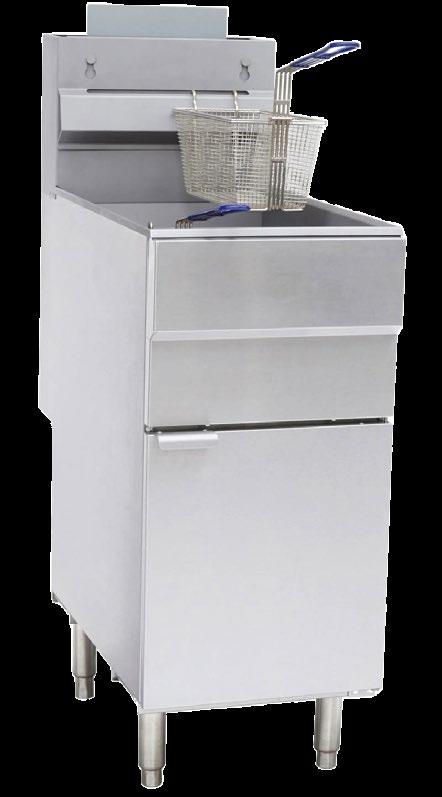
The Meiko M-iClean PF-S is a slimline potwashing powerhouse that is optionally available with energy saving heat recovery.
At only 775 mm wide and 898 mm deep, it takes up less than one square metre of floor space. However, the large wash chamber measuring 830 mm high, takes everything a potwasher must, including chopping boards, crates, sheet pans, and kitchen utensils.
The lower front door folds flat, providing ergonomic access for cleaning or loading heavy pans.
A fold-down weighted security grid with chains is optionally available to stop lightweight pans and reusable plastics from moving around or rotating during the wash.
The grid always stays in the machine and cannot get misplaced, which often happens to removable racks, especially in small spaces with limited storage.
All Meiko dishwashing comes with training support from Meiko UK for the lifetime of your Meiko machine.
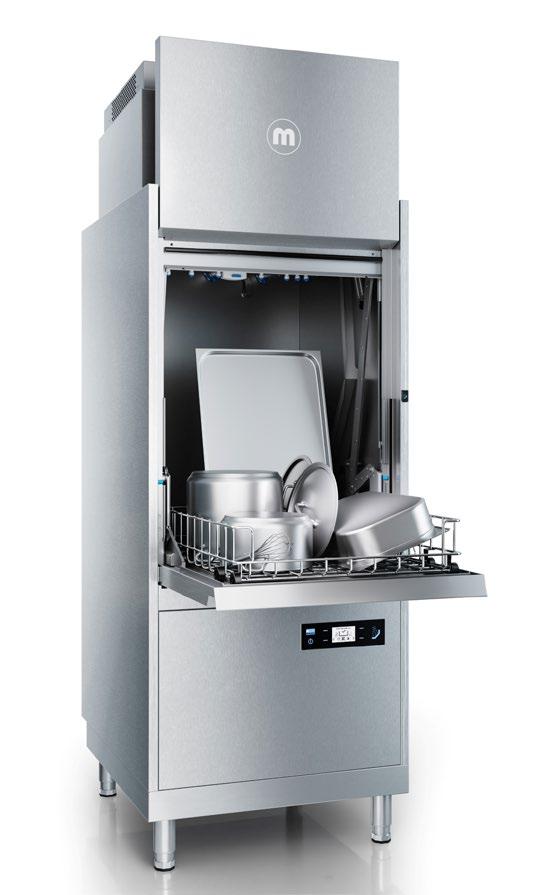

Stephens Catering Equipment, the leading provider of catering equipment across the UK and Ireland, is proud to announce its upcoming Fast Food & Retail Show, taking place on November 5th and 6th, 2024, at the Stephens showroom in Broughshane. The event will run from 10 am to 6 pm each day and promises to be an exciting opportunity for business owners and industry professionals alike.
Attendees will be treated to live cooking and demonstrations from some of the most innovative brands in the catering world, including Florigo, Broaster, Frymaster, Merrychef, Alto Sham, Ubert, Taylor, Hobart, Moffat, and Frijado. These industry leaders will showcase the latest in fast food and retail equipment, offering solutions designed to enhance efficiency, reduce costs, and improve product quality.
Live Cooking Demonstrations: Experience the latest in fast food equipment from top brands.
Exclusive Prize Draw: All attendees will be automatically entered into a draw for a chance to win a Panasonic microwave.
Stephens' Complete Catering Solutions: Discover how Stephens can provide everything from equipment and design to training, menu development, and aftercare services.
Dates: November 5th & 6th, 2024
Time: 10 am – 6 pm
Location: Stephens Catering Equipment Showroom, 205 Carnalbanagh Road, Broughshane, Ballymena, Co. Antrim, BT42 4NY
For more information about the event or to register your attendance, please visit our website at https://www.stephenscateringequipment.com/pages/fast-food-and-retail-show
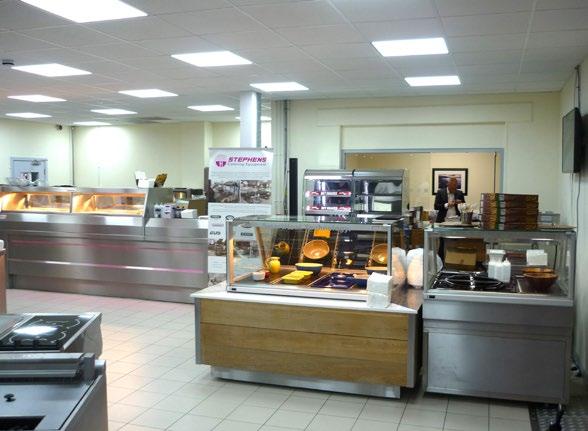
At Timeworks, we understand the unique challenges of the restaurant industry. Our advanced Time and Attendance systems are designed to cater to businesses with 5 to 5000 employees, streamlining operations and enhancing productivity.
Our comprehensive suite includes clocking systems, rostering and planning modules with HR and self-service tools. We support various hardware options like fingerprint, card/fob, PIN along with facial recognition, ensuring flexibility and security. Our rostering module allows managers to plan months in advance, view historical data, and communicate schedules via email.
The Self-Service app empowers
staff to manage their schedules and apply for leave, reducing administrative burdens.
We offer add-on modules such as Self-Service, HR Standard and Pro, Planning/Rostering Standard and Pro, E-Signature, and Cloud solutions. Our Hardware come with a 20-month warranty and free support for the first year with Kelio and 6 months with Timebox X4. Personalized training and support are provided by our dedicated engineers, both on-site and remotely.
Our customizable screens and tiles ensure that staff see only what’s relevant to their roles. With a fiveyear vision, we are committed to continuous improvement, bringing
innovative solutions to streamline processes and minimize administrative tasks.
Implementing our Time and Attendance systems will enhance your restaurant’s operational efficiency, allowing staff to be more self-sufficient and management to focus on delivering exceptional customer experiences.
Choose Timeworks for a more efficient and productive restaurant operation.


Interactive Displays Ireland is proud to be Ireland’s leading provider of digital signage solutions, catering to the hospitality sector with innovative and tailored products. Founded on the principles of customercentricity and technological advancement, we are the exclusive manufacturer of digital signage in Ireland through our in-house brand, Moytronix.
Our range of display solutions is designed to enhance guest experiences and streamline operations in hotels and restaurants. From interactive lobby displays to seamless menu boards, we provide businesses with tools to communicate effectively with their audience. Our flagship product, ScreenFusion.ai, is an AI-powered content management platform that allows users to manage digital signage content with ease,
offering automated updates and real-time adaptability based on audience engagement.
With a presence in the UK and EU, we continue to expand our reach, offering end-to-end services—from consultation and installation to ongoing support. Our dedicated team of 16 experts works closely with clients to deliver bespoke solutions that align with their branding and operational goals.
As members of IFSA, we are committed to driving innovation in the hospitality industry, offering reliable, cost-effective, and cutting-edge digital display technology to enhance your business.
For more, visit us at www.interactivedisplays.ie.
A
In a time of rising costs and increasing competition, it’s more important than ever for your hospitality business to stand out.
At Buttercups Uniforms, we understand that every member of staff represents your business and has the potential to impress both existing and potential guests. Our carefully curated hospitality range has a variety of uniforms to suit every role in your business, from kitchen staff to front of house, in many different styles, cuts and colours, in durable, easy-care fabric, chosen to suit the demands of even the longest and toughest shift.
What’s more, with 35 years of experience in the uniform industry,
Buttercups can help you make the right choice for your business according to your individual needs and your budget. Our dedicated account manager can work with you to make sure you get the best uniforms for your budget – an easy task as every piece in our collection is competitively priced.
The following is just a taste of what we have to offer:
Front-of-house staff Uniforms
Bar and restaurant staff Uniforms
Kitchen staff Uniforms
Housekeeping staff Uniforms
About Buttercups Uniforms
As a world-leading manufacturer of uniforms for over 35 years,
Buttercups Uniforms has built up an enviable reputation for producing elegant, professional and stylish workwear that is a pleasure to wear. We keep our prices low but our quality high –and we deliver, with grace.
Browse our beautiful collection on www.buttercupsuniforms.com –and remember to sign up for our newsletter, which will keep you informed with new styles, sales and exclusive discounts.
We are excited to share that Trinity Purchasing has officially joined Avendra International, a global procurement organisation.
GLOBAL PROCUREMENT. LOCAL EXPERTISE.
At Avendra International, we are a leading strategic procurement and supply chain partner to a diverse range of organisations, from hotels and resorts to healthcare and educational institutions around the world. With a presence in over 80,000 client locations globally, we bring unmatched expertise and a local touch to every partnership.
We understand that every hotel and restaurant is unique, with its own distinct goals and challenges. Whether you're looking to reduce costs, improve efficiency, drive innovation, or meet sustainability targets, our tailored solutions are designed to help you succeed.
Our local experts, supported by our $20 billion global procurement network, are there with you every step of the way, so that you can focus on what matters most: meeting your guests' and customers' needs.
We get it, and we can help!

At Avendra International, we provide the best of both worlds— global procurement power with local expertise.
Contact us to discuss your needs with our local expert, David Reynolds.
CONTACT INFO: David Reynolds, Managing Director, Avendra International. Ireland/ M: +353 86 4669125 EMAIL: hello_Ireland@avendra.com www.avendra.com
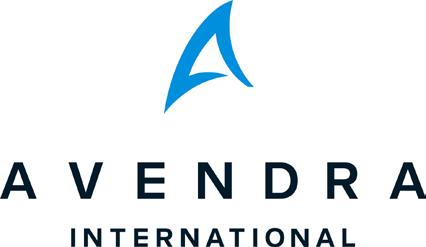
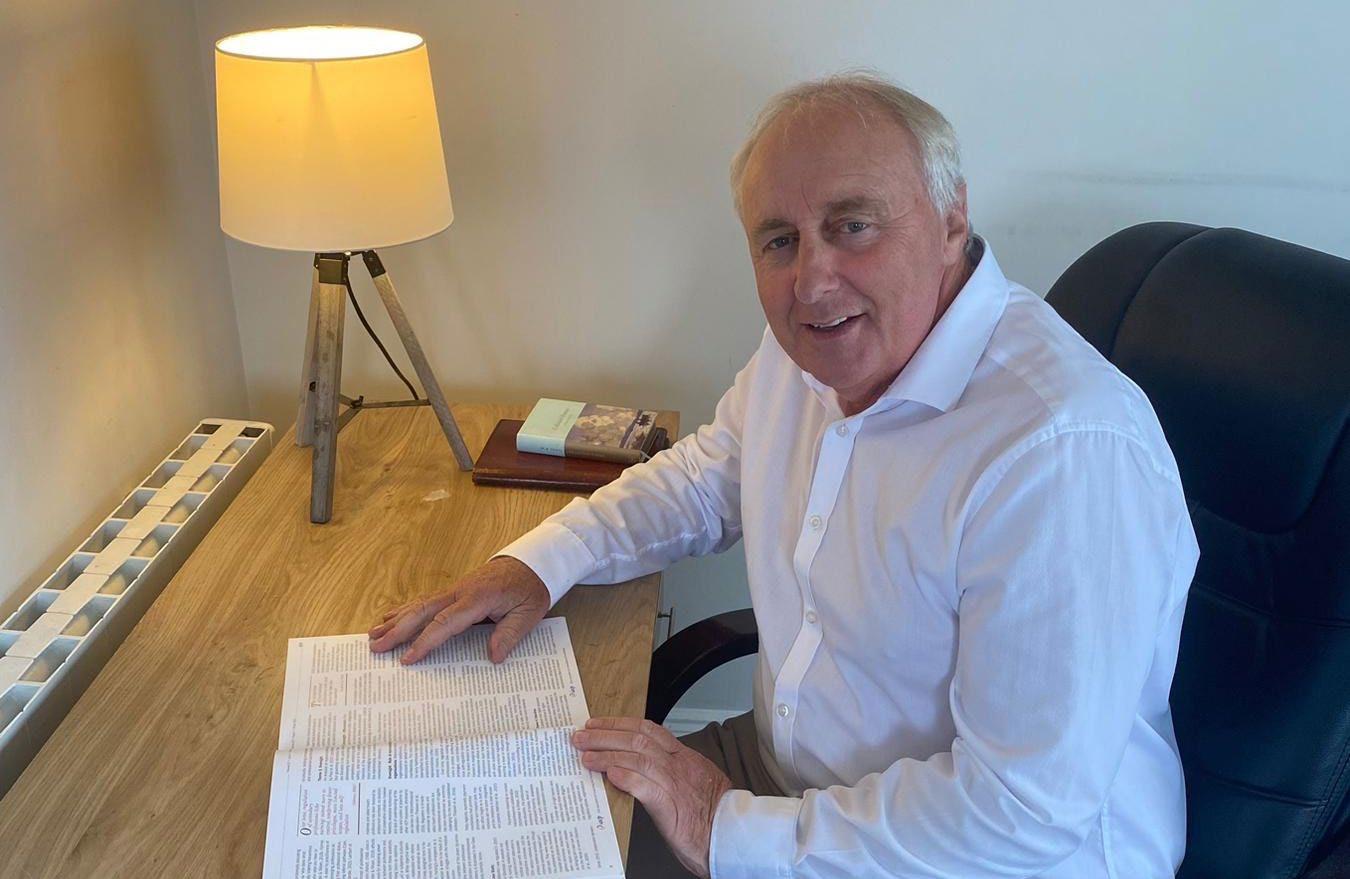
Having begun with a classic Irish education at the Christian Brothers school in his hometown of Gorey, County Wexford, Pat McEvoy would never have predicted ending up in the role of Corporate Wellbeing and Executive Coach at FBD Hotels.
“I’m living in Kildare for the last 40 years or thereabouts,” says Pat, who originally opted for the well-worn career path of the family law firm, ending up in the Chief State Solicitor’s office at Dublin Castle.
“It was a pensionable job and I enjoyed it to a certain extent,” recalls Pat,
“but I was always a bit of a square peg in a round hole… people used to come in and chat to me and even without any training, I always seemed to be able to understand what was going on in people’s lives –I’m a good listener, I suppose.”
At that time, Pat says, the Civil Service were completely sup-
portive of any employees who wanted to do a course and Pat opted for a two-year course in counselling at Maynooth University, which he completed in 1998. In terms of its application to the wider world in late 1990s Ireland, counselling rarely strayed beyond the two main areas of marriage guidance and addiction.
The newly-qualified counsellor followed up with a Mediator’s course in 1999 and then achieved a qualification in Neuro-linguistic Programming (NLP). He became a practitioner in NLP and then went on to study every weekend over a two-year period in yet another course – this time in Life and Business Coaching.
Friends who had a medical practice in Kildare offered him a part-time opportunity as counsellor and, as this role got progressively busier, he found himself with a full set of clients at night while still working a pensionable job during the day.
“Something had to give,” say
Pat, “and
the choice I made was to give up the full-time pensionable job and do something that I had been told I wouldn’t be able to make a living out of… but I just had faith in myself and I got great satisfaction out of it.”
Determined not to be limited to one area of counselling, Pat continued to add more courses to his portfolio, completing another in addiction counselling and another one in couples counselling.
“I was told that if you worked in one area only, you would suffer burn-out, so I became an eclectic counsellor.”
His business grew progressively, with word-of-mouth playing the main role in generating new clients. As Irish society was evolving, the very notion of counselling was going from being seen as American and pointless to a very normal part of life. In the beginning, Pat recalls, approximately 90% of his clients were women. Today, the majority of his clients are men and the age profile of them is continuing to decrease.
“As things progressed, I started to do a few corporate jobs for a few companies… employees are normally reluctant to open up to people in the company because they’re too close to them and counselling can’t work without creating an atmosphere of confidentiality first.”
“It’s a strange job in many ways because it’s in complete confidentiality. I don’t ever go home to my wife and tell her what happened to me today at work, for example.”
In 2020, FBD Hotels & Resorts CEO David Kelly approached Pat to ask him to work as a consultant with the group in the area of wellbeing. Pat took on the role with the proviso that any consultations with staff would be in complete confidentiality –something to which David Kelly readily agreed.
As Pat sees it, wellness in the context of a company employee is all about looking after the whole person and all aspects of their life.
“Work is only an eighth of what we call the Wheel of Life.
There are seven different other areas in which we can become involved… if we don’t look after our other areas such as our health, our wellbeing, our hobbies, our relationships – if they’re not right, then how can we come into a work situation?”
Pat sees his role as a very simple one – providing clarity in unravelling the complications, rather than adding anything complicated to people’s lives. “We need to take a ‘helicopter’ view of their situation and we need people to have a willingness to listen and to have an open mind… it’s also a job that you cannot do if you are in any way judgemental.”
As FBD moved back to normality after the Covid Lockdown period, it was decided that Pat’s role would be kept on. Clearly, wellbeing was recognised as an asset well worth retaining on a more long-term footing.
“It was decided that we would go out to all the hotels in the group and look after the staff in all the hotels,” says Pat. It was an innovative...
...approach for the group that introduced a function that the HR department would traditionally have got lumbered with.
The workload of the entire group with its 1700 staff members was significant enough to necessitate a reorganization of Pat’s role. The company decided to put in place an Employment Assistance Programme for every FBD staff member.
“It also meant that I would look after all of the senior staff in all the hotels – the four in Ireland and also at head office, and I would go every quarter to all of them.”
For the two Spanish hotels in the group, Pat’s lack of Spanish meant that he wasn’t able to fulfil the role in the same way, so FBD hired a Spanish counsellor to look after the Iberian-based staff, while Pat has an overseer role involving visiting the hotels there twice a year to talk to the senior staff.
Getting staff members to trust someone in Pat’s role takes a certain amount of time – particularly in the case where FBD have acquired a new hotel in the group. The natural tendency for some is for them to consider him a management spy rather than what he actually is.

“I would be the same,” says Pat. “I wouldn’t trust someone just because they seem to be a nice fellow. They have to see that I am true to my word; so, when I mean that it doesn't go farther than the door, then it doesn’t go farther than the door. And it wouldn’t be just the professional end of things that people can talk to me about. It can be all kinds of ongoing personal things that they can’t talk to other senior staff about.”
Pat points out that there is an assumption that those in positions of leadership are the ones with everything figured out but those positions can be amongst the loneliest places in an organisation. Where there are issues behind the scenes in the workplace, it can infiltrate the atmosphere of a hotel. Pat maintains that this is something that people can pick up on when they visit a hotel.
This is where the value of having a Wellbeing Programme pays off.
It facilitates the creation of a welcoming and pleasant ambience in the hotel, giving the customer a feeling of comfort akin to donning an old pair of slippers.
The other area where it pays off is in staff retention. The cost of the process of hiring new staff is considerable and it is reduced to a significant degree by having more contented staff within the organisation.
“In a busy hotel, everyone is very occupied in their various roles, so very often the show of appreciation – the pat on the back or saying, ‘well done’ can mean so much.“The fact that I’m there of itself makes people feel that they are really valued,” says Pat. “They feel listened to, supported and really appreciated.”
Let’s Grow! learniFI is Fáilte Ireland’s learning platform, offering over 250 courses and online content to upskill your teams and boost your tourism business. Designed by industry experts, there’s a wealth of knowledge just waiting to be discovered.
Sign up today at failteireland.ie/learnifi

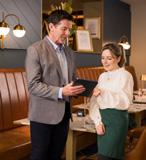

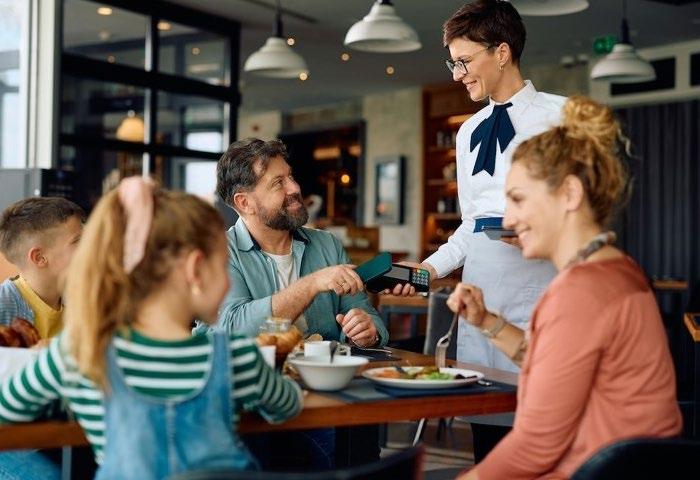
Early adoption of new payment methods is notoriously slow, requiring significant behavioural change across a broad range of everyday activities. However, Apple Pay has defied this trend for mobile payments, completely spearheading the shift towards contactless and mobile transactions.
With an estimated 604 million users globally in 2024, Apple Pay is rapidly gaining traction, particularly in regions with historically strong card penetration. While the US has long led the way for Apple Pay adoption, Europe has remained close by with the UK, a traditionally card-driven market, reportedly having 64% of consumers using Apple Pay for in-person transactions and 27% for online payments. Germany, while historically more reliant on cash and bank transfers, is also experiencing strong growth, with mobile payments increasing by an average of 13% annually.
This contrast in markets highlights the growing appeal and acceptance of mobile payments and wallet technology. The convenience of a simple tap, replacing clunky forms and card swipes, has redefined frictionless for millions. This has forced a shift in the industry and changed how hoteliers engage with their guests.
Why is Hospitality Uniquely Positioned to Benefit from Apple Pay and Mobile Payments? European hoteliers are embracing Apple Pay to cater to international tourists and the industry shift towards digital payments.
As travellers globally demand secure and frictionless payment experiences, the ability for hoteliers to offer widely accepted methods like Apple Pay is critical. Some studies suggest that 2 out of 3 consumers prefer to book online with businesses that accept their preferred mobile wallet.
Hotels that fail to cater to their guests' preferences risk losing bookings to OTAs and competitors, leading to a decline in the hotel’s key performance metrics, such as the revenue per available room (RevPAR).
Beyond the revenue opportunity, the integration of Apple Pay can enhance guests’ satisfaction, leading to repeat business and positive reviews, which, in today's competitive environment, can be a significant differentiator for the hotel's long-term success.
Guestline’s award-winning payment gateway offers Apple Pay, which provides hoteliers with the opportunity to offer their guests the convenience of wallet payments both online and in-person at their hotels.
Hoteliers on the Guestline platform are seeing increased conversion rates, especially those who actively advertise their acceptance of Apple Pay. Building on this success, we are developing the Google Pay integration to expand the payment options available to our hoteliers. These wallets set a new standard in payment technology with key features:
Apple Pay's technology leverages tokenisation, replacing the actual card number with a unique digital token for each transaction. This safeguards guest payment details, eliminating the need for manual entry of sensitive information like PAN numbers, expiry dates, or CVC codes. Even if a token is intercepted, card details remain secure, protecting hotels from reputational damage in the event of a data breach.
Apple Pay seamlessly incorporates robust authentication measures with multi-factor authentication methods like Face ID or Touch ID, adding another layer of security and significantly reducing the risk of unauthorised charges before they occur. This significantly helps reduce chargebacks.
Apple Pay boasts significantly higher authorisation rates thanks to its streamlined design. Biometric authentication, real-time authorisation, and pre-saved card details create a quicker, more secure checkout, minimising errors and declines. This benefits both guests and hoteliers, providing a seamless experience and increasing conversion rates.
Apple Pay customers tend to spend more on average, reflecting a younger and higher-income demographic with a greater propensity for spending. This can be a valuable benefit for hotels seeking to increase revenue.

Hotels using Guestline PMS with integrated GuestPay payments can easily implement Apple Pay with minimal technical effort, making it a fast and straightforward path to offer a more secure and convenient checkout experience for their guests.
With the increasing popularity of mobile-first booking journeys, it's no surprise that Apple Pay is leading the charge. It offers unparalleled simplicity and convenience through a tap or a few keystrokes, allowing hotel guests to have their preferred card readily available on their device. Guestline's own data reveal that 70% of bookings are mobile-driven, and according to McKinsey, mobile wallets are projected to surpass credit cards in overall purchasing share within the next few years. This is a trend that hoteliers cannot ignore!
The Apple Pay revolution is sweeping through the hospitality industry, and hotels that fail to adapt risk being left behind. Three key factors are driving this change:
and
Apple's iOS 15 has introduced new features that will further drive Apple Pay adoption in hospitality. Just like storing boarding passes in mobile wallets is now commonplace, Apple now allows users to store key cards and check-in directly through Apple Wallet. This provides a streamlined digital guest experience and operational efficiency for hotels.
Europe's move towards a unified digital identity framework, requiring private wallets to link with a new European digital identity wallet, creates a potential opportunity for solutions like Apple Pay. By allowing Apple Wallet to hold various ID documents, this could streamline self-check-in processes and drive further innovation in the hospitality sector.
Tap-to-pay will be the most important payment method for hotel organisations in 2024. According to Global Payments, 65% of hospitality businesses say they plan to prioritise this payment method.

It is clear that Apple Pay presents a compelling opportunity for growth for hoteliers. The decision to adopt Apple Pay is no longer a question of "if," but rather "when" and "how."
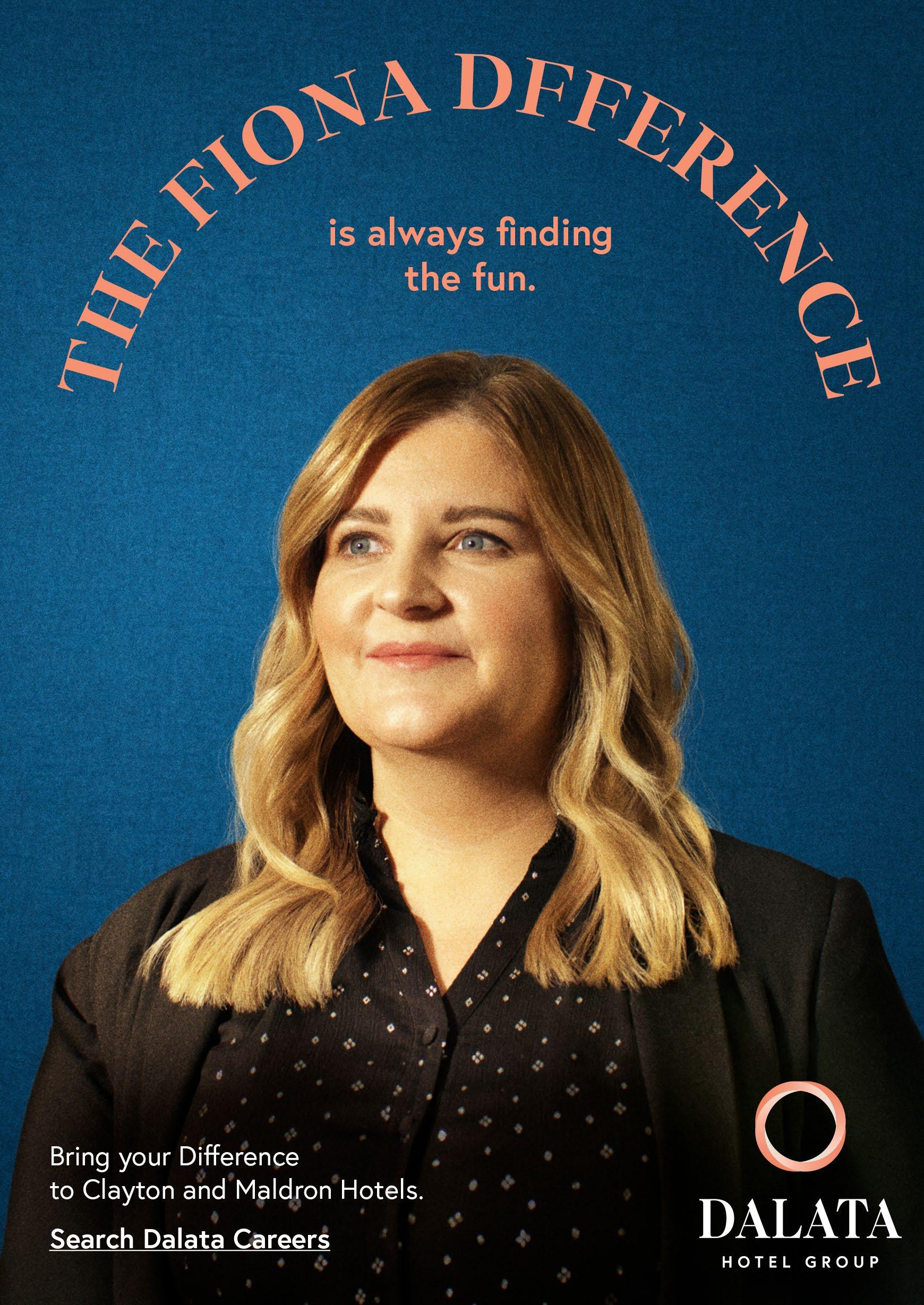

A product of Saint Malachy’s College, Belfast and Ulster University, Jordanstown; Desi Derby’s career path through the Irish retail scene has been impressive.
He has been working in Musgrave Wholesale Partners for almost nine years, currently as Wholesale Marketing Director, with additional responsibility for eCommerce & Customer Services.
“Before joining Musgrave, I was responsible for strategic development at Lidl and, before that, spent 15 years in the advertising agency space,” says Desi. “My largest client during that time was Tesco; so, very much a retail
background however I’ve worked across many different sectors – from recruitment to food manufacturing and tourism to renewable technologies.”
Musgrave is a fully Irish-owned national wholesale and retail business. As well as being Ireland’s largest one, it’s a family-owned operation and that, Desi says, reflects in the strong values that the company espouses and lives by:
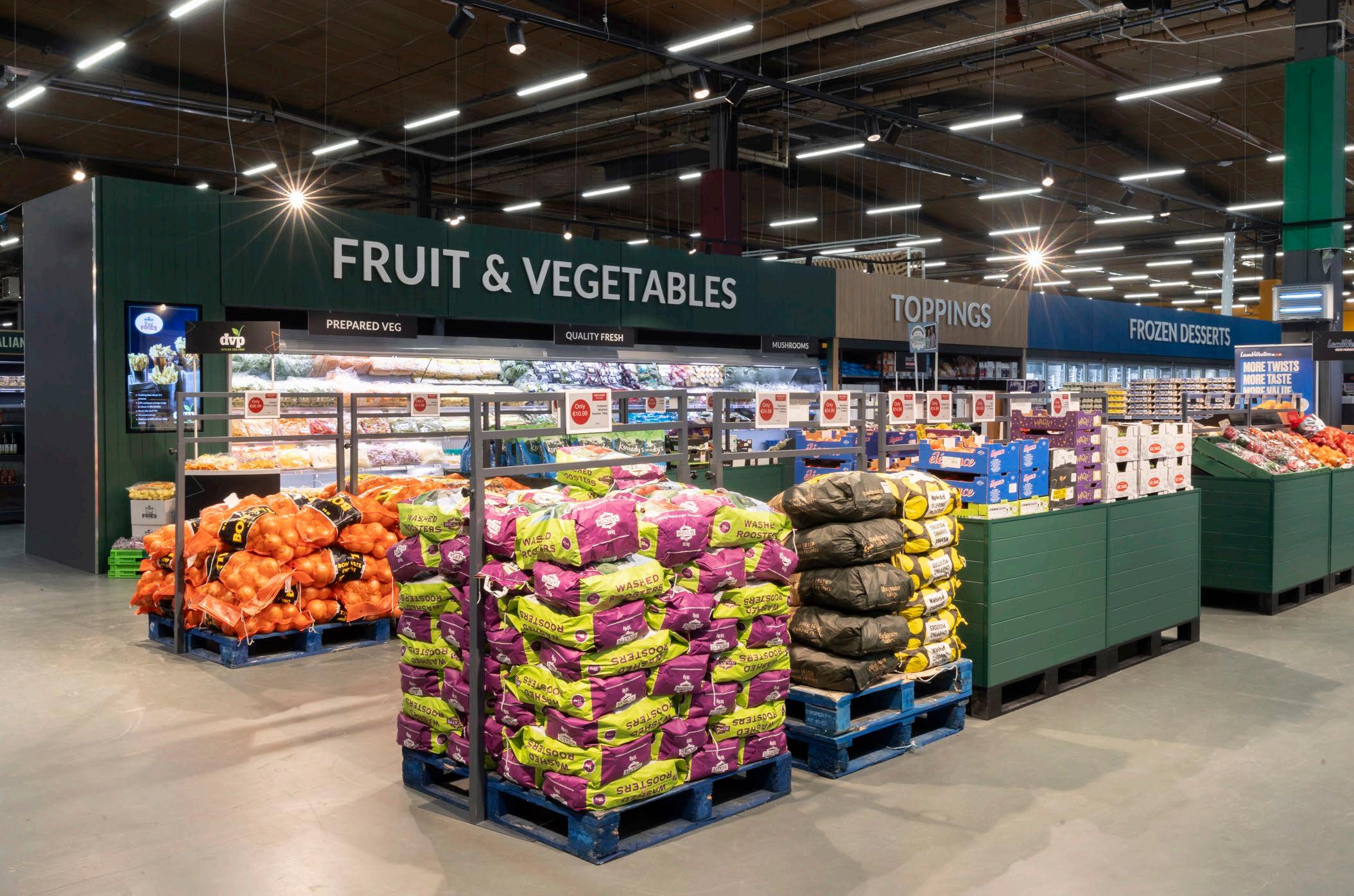
“It’s extremely rare, these days, to see a seventh-generation familyowned business,” says Desi. “And we are very proud to be the only 100% Irish-owned national wholesaler operating across the island today.
“I’ve experienced businesses where values are talked about but not really lived. With Musgrave, you have values that are both talked about but more importantly lived as part of our operations every day – honesty, working hard, achievement, long-term stable relationships and not being greedy. Those things are really important. They’re the values that have guided this business for 148 years. They’re no different today than they were when the Musgrave family established the business.” In the last eight years (with the only ‘interruption’ being that of Covid),
Musgrave has been very much on the acquisition trail, bringing a number of operations in Ireland and abroad under their umbrella.
“Back in 2014, we acquired the foodservice division of Allied Foods,” says Desi. “That was the first ‘line in the sand’ where this traditional wholesaler was moving more into foodservice. In 2015, we relocated our delivered foodservice operation into a new central warehouse in Blanchardstown. In 2016, we acquired the foodservice division of CJ O’Loughlin and then, in 2017, launched our next-generation Food Emporium at Ballymun.
“We’ve probably been on an accelerated journey of acquisition since 2018. We acquired the premium foodservice brand, La Rousse Foods, in 2018 and Italian distributor, Italicatessen in 2022.”
These were followed by Doyle’s Veg Prep in 2023 and two British-based premium foodservice businesses – namely Ritter Courivaud and Town & Country Fine Foods. The acquisition of Irish wine distributor, Febvre Wines, followed earlier this year, complementing their previous acquisition of Drinks Inc. in Northern Ireland.
All these acquisitions, Desi points out, aren’t some kind of real-life Monopoly game for Musgrave, but are in line with their customerfocused ethos. “Our aim is to ensure customers can get everything they need to run their business, and in particular from hero categories such as meat, fruit & veg, world foods, patisserie, coffee and alcohol. These acquisitions are part of a wider business strategy to grow a world class food and beverage business.
“The newly acquired businesses in Great Britain give us even more opportunity. Ritter Courivaud is a premium foodservice business, that’s very aligned to La Rousse Foods, for example, and I think that our experience in premium foodservice has set us up well for success in the GB market.
Understanding the needs of the customer is the starting point upon which all policy and business activity is based, as far as Desi is concerned. It’s all about how you can effectively become a long-term partner for your customer as their needs evolve.

“We’ve a new e-commerce platform that launched in 2023 and now over half of our customers are interacting with digital purchasing,” says Desi.
“The benefits of our e-commerce platform include real-time stock information, accurate delivery lead-times and customers can save lists, which makes it easy to go back and re-order. Alongside a core range of 15,000+ products, customers also have access to over 6,000 extended range products; a digital-only range aimed at helping customers to get everything they need to run their business in one place. In line with our brand promise “Business Made Easy”, we’re seeing 98% customer satisfaction rates.
Finally, from a sustainable perspective, Musgrave takes a typically long-term and realistic approach to the burning issue, with some impressive and quantifiable results to date.
“By 2030, we will be Ireland’s most trusted sustainable business in our sector,” says Desi of the clear ambition of Musgrave in this regard. Net zero point for the company is to be reached by 2040 and the same point for the value chain by 2050.
“Our strategy is called Growing Sustainably Every Day and it’s being delivered through three pillars: Creating Vibrant Communities; Caring for the Planet; Sourcing for Good.” In terms of action on the ground, the company has an ongoing partnership with FoodCloud since 2016,...

...through which they supply 250,000 meals annually to local charities. So far, that has accumulated to approximately 1.5 million meals, Desi says. Under the same ‘Vibrant Communities’ pillar, there are other significant activities. These include substantial charity work with Focus Ireland, our 2024 charity partner and a €350,000 investment in the future of the Irish foodservice industry, through a €350,000 partnership with TU Dublin’s School of Culinary Arts, that includes bursaries and mentoring for students during the duration of their education. It’s a symbiotic relationship, Desi points out, where Musgrave also learn from the new generation in terms of food trends and ideas.
Under the ‘Caring for the Planet’ pillar meanwhile, 90% of the company’s own brand packaging is currently either reusable, compostable or recyclable. By 2025, that figure will be 100%.
“In terms of our supply chain, we’re focused on HVO.... (Hydrotreated Vegetable Oil),” says Desi. “It’s an alternative fuel source and we’re
“And that’s 630 tonnes of food waste and over 2,000 tonnes of CO2 emissions avoided,” he adds. “This is food that is fit for human consumption, but which otherwise would have gone into landfill.”
on track to have 55% of our vehicles using sustainable fuel sources by 2030. While in our branch network, we’re powered by 100% green electricity.
“From a local sourcing perspective (part of the ‘Sourcing for Good’ pillar), Musgrave Marketplace spends over €660 million annually on local food and drink – working with 800 local suppliers and showcasing 3,500 Irish products.”
Added to this is their Green Shoots initiative in collaboration with Bord Bia. The objective this year is to see 15 Irish artisan suppliers selling through Musgrave Marketplace to their customers, giving small businesses an opportunity for growth in foodservice.
Sustainability suits the Musgrave mindset very well. As Desi puts it, it has always been in the Musgrave DNA to leave the world in a better place than we found it.

